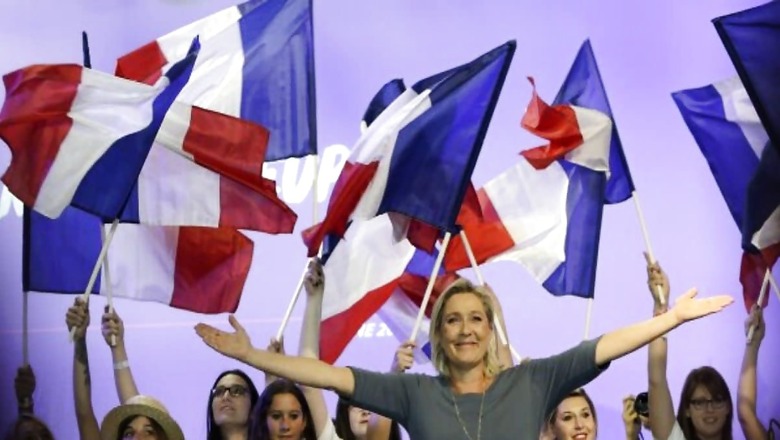
views
While the centre-right European People’s Party was the overall victor in the recently held elections, the major gains made by far-right parties across the bloc is what has made news waves. In France, the National Rally of Marine Le Pen raked in nearly a third of the total votes, shaking the ground under President Emmanuel Macron’s feet, who immediately called for a snap election in an attempt to save his party’s prospects. More than a quarter of Italian voters, meanwhile, favoured Prime Minister Giorgia Meloni’s Brothers of Italy party, making hers among the most resounding Conservative wins in Europe.
In Germany, Chancellor Olaf Scholz’ ruling coalition suffered a crushing blow, registering its worst performance in nearly a century. In Germany too, the Conservatives won resoundingly. While the centre-right Christian Democrats won over 30 per cent of the votes, the far-right Alternative for Germany (AfD) finished second with 16 per cent – a gain of 5 percentage points from 2019.
Apart from the centre-right European People’s Party’s 189 legislators, the far-right has emerged as the second-biggest bloc in the European parliament. The European Conservatives and Reformists (ECR) and the Identity and Democracy (ID) group together control 131 seats. Add to that AfD’s 15 legislators from Germany, 10 representatives of Hungarian Prime Minister Viktor Orbán’s Fidesz party, six belonging to Poland’s Confederation party, six and three from Spain’s Vox party and the far-right “Party is Over” respectively, and three members of Bulgaria’s pro-Kremlin Revival party.
This takes the Conservative representation in the European parliament to over 360. There is no doubt that such numbers are bound to bring about a wider right shift in EU policy. Across Europe, right-wing parties and formations have governments in Hungary, Slovakia, Italy, Sweden, Finland and the Netherlands. The United Kingdom is another country to watch out for. Despite not being part of the EU anymore, Britain has found it hard to escape the pan-continental rise of the Right. Nigel Farage’s populist far-right Reform Party has overtaken the Tories in polling for the first time. If this trend holds till July 4, which is when the UK votes for a new government, British politics could be in for a tectonic shift. The mere thought of a far-right party eating into Conservative spheres of influence should send a shiver down the spine of Tories.
The rise of the Right is hardly a phenomenon exclusive to Europe. Conservatives have emerged as a strong and resurgent political force in several democracies around the world. Most astonishing has been the victory of far-right politician, Javier Milei, in Argentina. Argentina is not alone. In Latin America, right-wing populists have made inroads in Chile, Paraguay and El Salvador as well.
In the United States, Donald Trump maintains a considerable lead over Joe Biden and has a real chance of winning the presidency once again. It would not be an overstatement to suggest that Trump’s victory would further catalyse the rise of Conservatives and populists around the world, most markedly in Europe. The rise of the Right also becomes manifest by the fact that in the US, Trump’s support among black voters has witnessed a meteoric rise. A CNN analysis recently found that Trump could end up winning as much as 21 per cent of the black vote in this year’s election. That will be a nine-percentage point climb for Trump among what is largely seen as a Democrat vote bank. More importantly, Biden’s support among blacks aged below 50 years has fallen to 37 points from 80 points in 2020.
Read More | Out But Not Over: Why Donald Trump Remains the Strongest Republican in America
Meanwhile, here in India, Narendra Modi is back as Prime Minister – albeit with a diminished mandate, far short of what the BJP was hoping for. Notwithstanding the scale of the mandate, India still has a right-leaning, nationalist formation in power for the third straight term – a telling indicator of how Indian polity has dramatically changed since 2014. Interestingly, unless populist leaders go all-out authoritarian, they too come under the extreme pressures of anti-incumbency and risk losing power to others. While PM Modi evaded a resounding defeat, Jair Bolsonaro of Brazil was not so lucky. Neither was Donald Trump in 2020.
In democracies, therefore, power switching hands is inevitable. However, when the same side of the political spectrum witnesses a resurgence across the democratic world at roughly the same time, it becomes a sign of what the electorate wants from their governments.
What Explains the Rise of the Right?
As Left-leaning parties and leaders are realising the hard way, ordinary people are not captivated by idealistic liberal notions beyond a point. While tolerance, secularism and diversity are all notions central to Europe and the Western democratic world, they are no substitutes for effective governance and handling of real issues.
For Europeans, the cost-of-living crisis has gone out of hand. It is much more difficult for an average European today to make ends meet than it was in 2019. For context, while Europe’s inflation has eased significantly from the peak it registered in 2022, it is yet to return to pre-Covid levels. Essentially, Europeans have been reeling under a cost-of-living crisis for nearly three years now. Consumption has dipped as Europeans become extremely wary of spending unnecessarily, so much so that several food companies and retailers are now resorting to rampant discounting to entice consumers. However, this strategy is bearing little results.
Rampant immigration and demographic change have emerged as the biggest reason behind the Right’s rise, especially in Europe. The demographic change in Europe is now visible, with refugees from the Middle East and North Africa (MENA) region not just arriving to European shores in hordes, but also thumping their own identity and way of living over that of original Europeans. In many ways, the rise of the Right in Europe appears to be a natural response to the brazen open-arms policy that centrist and liberal governments of the bloc, and the European Union itself have championed for years.
That they are now attempting to tone down that policy themselves is a telling sign of how the mood of the average European has turned anti-immigration. Coupled with falling birth rates, deteriorating standards of living and labour shortages, the younger population of Europe is beginning to believe that if drastic corrective measures are not taken now, the opportunity may be lost forever. Conservatives, interestingly, have marketed themselves as antidotes to Europe’s biggest problems – economy and immigration.
Additionally, most of the Western world has grown a real sense of fatigue when it comes to funding wars abroad. For example, people are now genuinely worried about how the national political discourse of their countries has been almost completely hijacked by external wars – those in Ukraine and West Asia. This phenomenon is becoming especially pronounced in the United States – the largest contributor to both Ukraine and Israel.
The cumulative impact has been that voters are now veering towards parties that promise to fix the economy, crackdown on immigration and even undertake mass deportations, if need be. Essentially, voters want their domestic bread and butter issues to be the top priority of their governments, and not what the outcome of the war in either Eastern Europe or West Asia may be.
While the Right may not have a concrete plan of action to address these issues, the mere perception that governments need to be strong-headed in confronting national challenges is becoming increasingly pronounced in the democratic world order. This is fuelling the rise of the Right in democracies around the world.
Views expressed in the above piece are personal and solely those of the author. They do not necessarily reflect News18’s views.



















Comments
0 comment